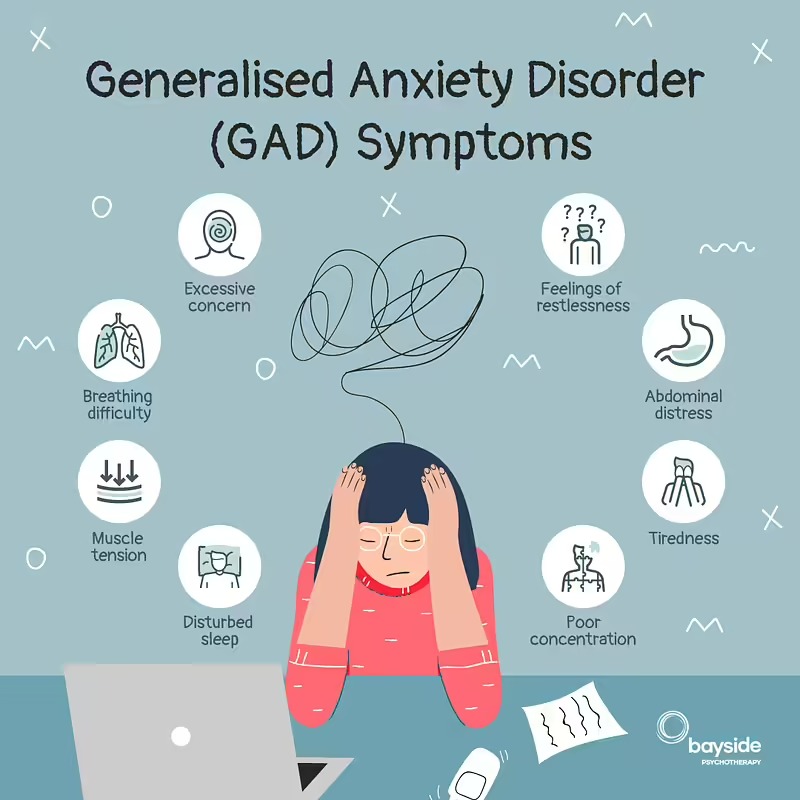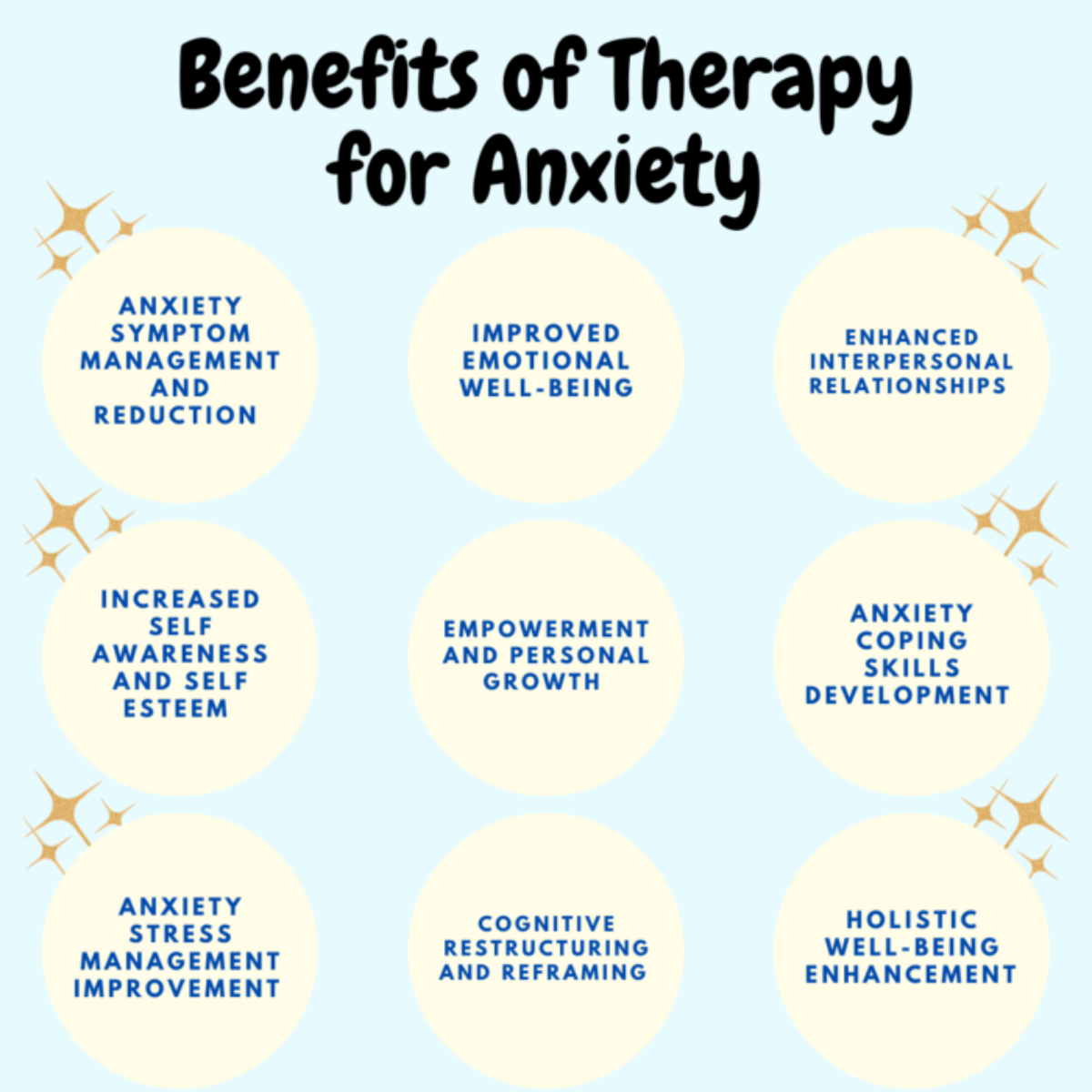Effective Methods in Coaching for Stress And Anxiety Disorder: A Course to Healing
When facing stress and anxiety disorders, you could really feel uncertain and overloaded of where to turn. Reliable therapy methods can lead the way for recovery, providing you with the devices to browse your challenges. From cognitive-behavioral techniques to mindfulness practices, each technique uses one-of-a-kind benefits. Understanding exactly how these techniques interact can make a significant difference in your journey. What are the crucial components that will guide you in the direction of lasting adjustment?
Understanding Stress And Anxiety Conditions: A Detailed Overview
It's crucial to identify that they incorporate a variety of problems identified by too much anxiety or worry when you think about anxiousness conditions. These problems can materialize in different means, consisting of generalised anxiety disorder, panic attack, and social anxiety problem. You might experience signs and symptoms like quick heart beat, sweating, or difficulty focusing. It's usual to feel overwhelmed, and these feelings can disrupt everyday life.Understanding the source of anxiousness is necessary. They can originate from genetics, brain chemistry, or ecological aspects. You may discover that specific scenarios activate your anxiousness, making it important to determine these triggers.
Cognitive Behavior Modification (CBT): Reshaping Thought Patterns

Mindfulness and Leisure Techniques: Growing Present-Moment Understanding
Mindfulness and leisure methods aid you cultivate present-moment awareness, allowing you to take care of anxiety better. By concentrating on the present moment, you can break without the cycle of fear and rumination that commonly fuels anxiety. Beginning by exercising deep breathing exercises. Breathe in gradually through your nose, hold for a moment, then exhale via your mouth. This easy technique can soothe your mind and body.Engage in mindfulness reflection by setting aside a few mins each day to observe your thoughts without judgment. Pay focus to your breath, experiences, and the sounds around you. You may additionally find value in modern muscular tissue relaxation, where you strained and kick back each muscular tissue group, promoting physical and psychological ease.Incorporating these strategies into your daily routine can produce a better feeling of control, reduce stress and anxiety symptoms, and improve your general health. Keep in mind, consistency is crucial to experiencing the advantages.
Exposure Therapy: Encountering Fears Slowly
Exposure treatment aids you face your worries progressively, permitting you to construct self-confidence over time. By utilizing progressive direct exposure strategies, you can gradually confront what makes you anxious while developing efficient coping systems. This process not only minimizes your concern yet additionally encourages you to manage anxiousness extra efficiently.
Progressive Exposure Methods
When you challenge your anxieties progressively, you can effectively decrease stress and anxiety and restore control over your life. Gradual exposure methods entail encountering your concerns tip by action, beginning with much less intimidating situations. You might begin by picturing the feared scenario, then advance to checking out photos or videos associated to it. Eventually, you can practice challenging the anxiety in actual life, however only when you really feel prepared. This method permits you to develop confidence as you relocate with each phase. Keep in mind to pace on your own; hurrying can enhance stress and anxiety. Celebrate little success along the road, as each progression empowers you. By continually applying these techniques, you'll find that your fears begin to lose their hold on your mind.
Building Coping Mechanisms
Structure efficient coping mechanisms is essential for taking care of stress and anxiety, especially as you face your worries slowly through direct exposure therapy. Beginning by identifying your certain fears and damaging them down into workable actions. By doing this, you can slowly challenge each worry without ending up being overloaded. If you have a hard time with social circumstances, beginning by exercising tiny interactions, like greeting a neighbor.Alongside gradual exposure, incorporate relaxation methods such as deep breathing or mindfulness to relax your mind prior to encountering triggers. Maintain a journal to track your progress and celebrate small victories. Surround on your own with encouraging pals or a specialist that can guide you. Keep in mind, it's a trip-- perseverance and persistence will enhance your coping mechanisms, resulting in higher strength against stress and anxiety.
Encouraging Therapy: Structure Count On and Relationship
To effectively support somebody with anxiousness, establishing depend on and connection is necessary from the really initial session. You'll wish to develop a secure room where they feel comfortable expressing their thoughts and feelings without judgment. Active listening is essential; show authentic rate of interest in website what they share. Recognize their sensations and verify their experiences. It is essential to be empathetic, as this aids build a link and urges openness.Be constant in your technique and preserve confidentiality to further strengthen that trust fund. Usage open body movement and make eye get in touch with to communicate your listening. Remember, your patience goes a long way; building rapport takes time, and it's essential to value their speed. By fostering this supportive setting, you'll encourage them to involve even more totally in the restorative process, making it easier for them to discover their anxiousness and job toward recovery.
Group Treatment: Shared Experiences and Cumulative Healing
Team therapy can be an effective tool for those handling anxiousness conditions, as it allows people to share their experiences and find relief in the understanding of others. In this helpful environment, you can reveal your feelings without anxiety of judgment. Listening to others' tales can normalize your own experiences, making you really feel much less alone in your struggle.Participating in team therapy aids you establish dealing methods through shared understanding and understandings. As you listen to others, you may find new means to tackle your anxiousness that you hadn't taken into consideration before.Moreover, the cumulative healing that happens in these sessions can foster a sense of area, reminding you that you're not facing your challenges alone.Building connections with others that understand your battle can boost your self-confidence and motivation to challenge your anxiety. Group treatment produces a space where development and healing end up being a shared journey, encouraging you to take actions towards healing.
Integrating Way Of Life Adjustments: Holistic Strategies to Stress And Anxiety Monitoring
While therapy provides crucial assistance, integrating way of living adjustments can substantially improve your capability to handle stress and anxiety. Begin by integrating regular exercise into your routine. Exercise launches endorphins, which can boost your state of mind and minimize anxiety. Next off, focus on your diet plan. Consuming a balanced diet regimen abundant in fruits, veggies, and whole grains can positively impact your psychological well-being. Do not neglect concerning rest-- go for 7-9 hours per evening, as top quality remainder is important for emotional regulation.Mindfulness practices, such as meditation or yoga exercise, can also help you stay based and existing. Consider alloting time each day to practice these techniques. Restriction high levels of caffeine and alcohol intake, as they can aggravate anxiousness signs. By making these alternative changes, you create a stronger foundation for managing anxiousness, enhancing the advantages acquired from therapy. Remember, every small action depend on your course to recuperation.
Frequently Asked Questions
What Are the Usual Physical Signs of Anxiety Problems?
Common physical signs of anxiety problems include quick heart rate, lack of breath, muscular tissue stress, sweating, and headaches. You may also experience tiredness, dizziness, or stomach problems, which can additionally complicate your daily life.
How Much Time Does Counseling for Anxiousness Usually Take?

Therapy for anxiousness generally takes a couple of weeks to numerous months, relying on your specific needs and development. counselling for anxiety. You'll find that routine sessions assist you create dealing techniques and obtain insights right into your anxiousness
Can Anxiety Conditions Be Totally Treated?

What Should I Do in a Panic Strike?
Throughout an anxiety attack, concentrate on your breathing. Breathe in deeply with your nose, hold for a moment, then exhale gradually - counselling for anxiety. Ground on your own by calling items around you, and remind yourself it will certainly pass
Are There Medications for Anxiety Problems?
Yes, there are numerous medicines for stress and anxiety disorders, consisting of benzodiazepines and antidepressants. You ought to seek advice from a health care professional to discover the right therapy plan tailored to your details requirements and circumstances for the finest results. When you assume regarding anxiety disorders, it's essential to recognize that they incorporate a range of problems characterized by too much fear or concern. These problems can manifest in numerous ways, including generalised stress and anxiety problem, panic condition, and social anxiousness condition. Building efficient coping devices is essential for taking care of stress and anxiety, especially as you encounter your concerns slowly through exposure treatment. Team treatment can be a powerful tool for those dealing with anxiousness problems, as it allows people to share their experiences and locate solace in the understanding of others. As you listen to others, you might discover new methods to tackle your anxiety that you hadn't considered before.Moreover, the collective healing that takes place in these sessions can promote a sense of neighborhood, advising you that you're not encountering your difficulties alone.Building links with others who understand your struggle can improve your self-confidence and motivation to confront your stress and anxiety.